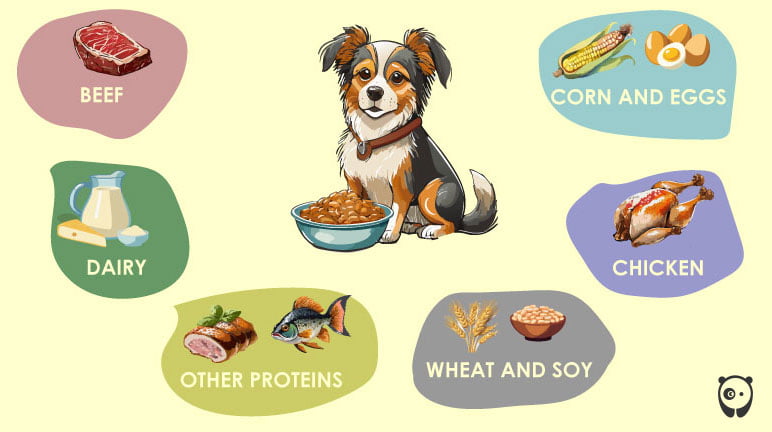DOGS
How To Identify And Manage Dog Food Allergies
In the realm of canine health, it’s imperative to understand the nuanced differences between dog food allergies and sensitivities, even though their manifestations may appear similar at first glance. Allergies manifest when a dog’s immune system reacts to a familiar trigger, resulting in uncomfortable symptoms such as itchy skin and gastrointestinal issues. Conversely, sensitivities, a more prevalent occurrence, steer clear of immune system involvement, typically presenting themselves through stomach upset.
The significance of discerning between these two lies in the tailored solutions each necessitates. A keen awareness of whether your canine companion is grappling with an allergy or a sensitivity allows for a more targeted and effective approach to address their unique dietary needs and overall well-being. Educating oneself on this distinction becomes not only a matter of canine health but also a pathway to providing optimal care and comfort for our four-legged friends.

Image credits: freepik
When dogs experience food allergies, their bodies perceive specific food components, such as proteins or carbs, as potential threats. This misguided response triggers the immune system. On the other hand, food sensitivities differ, as they do not elicit an immune system response and primarily manifest as gastrointestinal issues.
Immune Response: In allergic reactions, dogs‘ bodies actively combat the perceived harmful food, resulting in inflammation and various symptoms. The immune system must have encountered the allergen previously to initiate this response.
Types of Reactions: Food allergies can manifest as itchiness in a dog’s skin, digestive upset, or even respiratory difficulties. These issues arise from the body’s attempt to eliminate what it deems harmful.
The Role of the Immune System: The primary function of the immune system is to protect against germs and foreign substances. However, in the case of allergies, the immune system erroneously targets specific foods, leading to the observed problems associated with food allergies.
Contrary to common perception, food allergies in dogs are relatively uncommon. Issues like seasonal allergies and challenges with fleas or ticks occur more frequently. Only a small fraction, approximately 0.2%, of dogs are affected by food allergies.
Most Common Food Allergies In Dogs

from boredpanda
Dog food allergies often originate from proteins in specific foods like beef or chicken. It’s crucial to understand that these allergies do not imply the foods are inherently bad. Instead, it’s a matter of dogs’ immune systems overreacting, misidentifying proteins as harmful elements.
Common Food Allergens and Prevalence:
- Beef: Noted in 34% of dogs.
- Dairy Products: Affect around 17% of dogs.
- Chicken: Poses an issue for 15% of dogs with allergies.
- Wheat and Soy: Trouble for 13% and 6% of dogs, respectively.
- Other Proteins (Lamb, Pork, Fish): Cause reactions in 5% to 2% of dogs.
- Corn and Eggs: Each impacts 4% of dogs; Rice is problematic for 2%.
It’s noteworthy that dogs may develop allergies to these foods over time, even if they’ve previously tolerated them well. The complex process of allergy development involves the immune system perceiving food proteins as adversaries. Recognizing common allergens empowers dog owners to monitor for signs and make dietary adjustments proactively.
Common Signs of Food Allergies in Dogs
Food allergies in dogs can manifest in various ways, creating confusion for both pet owners and veterinarians. Recognizing these symptoms early is crucial, and seeking veterinary assistance is essential for proper treatment.
Skin Issues: The primary indicator often involves skin problems. Dogs may experience excessive itching, leading to skin damage and hot spots resulting from relentless scratching. Contrary to popular belief, skin reactions are more prevalent than stomach issues as a sign of food allergies.
Ear Infections: Dogs with these allergies may frequently develop ear infections. Itchy and inflamed skin can extend to the ears, causing discomfort and potentially leading to more severe infections if not promptly addressed.
Gastrointestinal Problems: Some dogs may exhibit stomach-related problems such as vomiting and diarrhea. However, these symptoms can also be indicative of other health issues, making it challenging to confirm a food allergy without additional tests.
Respiratory Symptoms: Although less common, certain dogs may experience breathing difficulties due to food allergies, typically in conjunction with other allergy types.
Overlap with Other Conditions: The signs of food allergies often mimic those of other conditions like environmental allergies or infections. For instance, itching and ear infections could result from factors like pollen or dust, which tend to vary with the seasons. Therefore, consulting with a vet is crucial to ensure an accurate diagnosis of a food allergy.
Given the varied nature of allergy symptoms, professional veterinary assessment is essential. Vets may employ specialized diets or food trials to determine if a dog has food allergies, closely monitoring the dog’s response to dietary changes.
Diagnostic Process of Food Allergies In Dogs

Image credits: Peggy_Marco
Identifying whether a dog is suffering from food allergies begins by examining its symptoms. The primary indicator is persistent itchiness that remains consistent throughout the seasons. Dogs may experience generalized itching or focus on specific areas such as the face, ears, legs, feet, and underarms. Additionally, they might exhibit gastrointestinal issues like vomiting, diarrhea, or abdominal discomfort. However, these symptoms can be ambiguous and intermittent, posing a challenge in pinpointing the underlying problem.
Prioritizing a systematic approach, it’s crucial to rule out other potential issues, including parasites like fleas or mites, skin infections, or alternative allergies. This initial investigation ensures accurate diagnosis and confirmation of a food allergy as the actual concern.
Food Trials: Establishing the Benchmark
The most reliable method for confirming a food allergy in dogs involves conducting food trials. This entails providing the dog with a specialized diet free from common allergens for a duration of eight to twelve weeks. If the dog’s condition improves during this period, reintroducing the old diet helps determine if the symptoms reappear, ultimately confirming the presence of a food allergy. Adhering to this exclusive diet without any lapses requires significant effort on the part of pet parents.
Various approaches to food trials exist to identify potential food allergies in dogs:
- Prescription diet with hydrolyzed protein: This diet involves breaking down proteins into minuscule pieces. These tiny particles cannot trigger allergic reactions as they do not adhere to the body’s allergy receptors.
- Elimination diet: This diet features a singular type of protein and carbohydrate. It can be either specially formulated by a veterinarian nutritionist or a homemade diet under veterinary guidance. Elimination diets are typically utilized to pinpoint the presence of a food allergy rather than serving as a long-term dietary solution. If skin or ear issues resolve during this diet, it indicates a food-related problem, allowing pet owners to search for a regular diet that won’t adversely affect the dog’s health.
- Diets with “novel” protein or carbohydrate sources: These diets incorporate unconventional ingredients less likely to induce allergies.
- Skin-friendly diets: Formulated with specialized nutrients, these diets aim to soothe the immune system’s reactivity.
Engaging in food trials or elimination diets stands out as the most effective strategy for identifying and managing food allergies in dogs.
Distinguishing Between Food Allergies and Food Intolerances
It’s crucial to differentiate between food allergies and food intolerances. Food allergies trigger an immune system response and can manifest as skin problems or itching, while food intolerances predominantly result in stomach issues without involving the immune system. Understanding this distinction is essential for determining the most effective approach to aiding the dog.
Drawbacks of Alternative Testing Methods
Despite the use of blood or saliva tests in identifying food allergies in dogs, these methods lack reliability. Research indicates that such tests struggle to accurately identify canine allergies, potentially leading to incorrect dietary choices. Consequently, these tests should not be relied upon for determining food allergies in dogs.
Managing Dogs with Food Allergies
Effectively addressing food allergies in dogs involves modifying their diet to eliminate foods that trigger adverse reactions. Identifying problematic foods typically begins with a food trial or elimination diet under the guidance of a veterinarian.
Dietary Adjustments and Hypoallergenic Diets
Many dogs with food allergies may require a specialized diet that excludes common allergens. These diets often feature unconventional meat sources such as kangaroo or venison, or proteins broken down into small components to prevent the dog’s body from reacting. It is imperative to seek veterinary assistance when implementing these diets for your dog’s well-being.
Regular Veterinary Check-ups
Consistent veterinary check-ups play a crucial role in monitoring the effectiveness of the new diet and determining if any adjustments are necessary. Veterinarians can recommend specialized diets designed for dogs with allergies, some of which also address skin problems and inflammation associated with allergic reactions.
Additional Treatments
In addition to dietary changes, veterinarians may prescribe medications to alleviate symptoms, particularly in cases where the dog is affected by multiple allergies. Supplements such as omega fatty acids can contribute to improved skin health and a reduction in allergy-related signs.
Long-term Management
Managing food allergies in dogs is an ongoing process, requiring perpetual vigilance regarding the canine’s diet, including treats, and the avoidance of table food containing potential allergens. Some dogs respond well to prescription diets tailored for allergy issues, such as Hill’s Prescription Diet z/d, Royal Canin Hydrolyzed Protein HP, and Purina Pro Plan HA.
In summary, effective management of dog food allergies entails a comprehensive plan encompassing dietary adjustments, regular veterinary visits, and occasionally additional treatments. Collaborating closely with a veterinarian remains the optimal approach to ensuring the well-being and happiness of a dog with food allergies.
Breed-Specific Considerations
It’s important to note that certain breeds are more susceptible to dog food allergies than others. A well-defined plan is essential to address and care for these allergies in specific breeds. Let’s explore which breeds are most at risk and how to support them:
Breeds Prone to Food Allergies
French Bulldogs: The presence of specific genes and skin folds makes French Bulldogs susceptible to food allergies and skin issues. Vigilant dietary monitoring and regular cleaning of skin folds are essential for effective management.
Boxers: Prone to both environmental and food allergies, Boxers often experience skin itching. Identifying the root cause and collaborating with a veterinarian to devise a comprehensive plan is crucial.
Labrador Retrievers: With their dense fur acting as a reservoir for allergens, Labrador Retrievers frequently encounter skin problems. Addressing specific food proteins in their diet and increasing grooming routines can help alleviate these issues.
German Shepherds: Susceptible to skin and stomach allergies, German Shepherds benefit from a management approach that involves dietary control, flea prevention, and consideration of immunotherapy.
Golden Retrievers: These dogs commonly face challenges such as skin problems, ear infections, and allergies impacting their breathing. Proper care involves the standard practices of allergen avoidance and maintaining a clean and hygienic environment.
Conclusion: Managing Common Dog Food Allergies
Effectively handling dog food allergies encompasses vigilant symptom observation, food testing to identify allergens, and adjusting their diet for better health. Breeds like the French Bulldog, Boxer, Labrador Retriever, German Shepherd, and Golden Retriever are more predisposed to these issues. Collaborating closely with a veterinarian is paramount to ensuring the well-being of dogs with food allergies.
